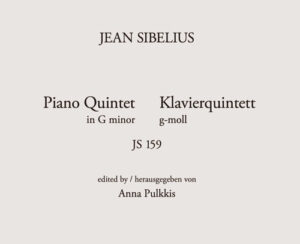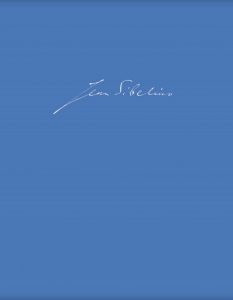
The Lahti International Sibelius Festival’s artistic director, conductor Hannu Lintu, is making a historic change right at the start of his tenure. In the years to come, the Sibelius Festival programme will include music by other composers alongside that of the composer after whom it is named. Lintu has planned a three-festival package that will bring world-famous musicians to Lahti’s Sibelius Hall.
‘I am particularly excited about the opportunity to transform the programme of the Sibelius Festival’, said conductor Hannu Lintu when his appointment as artistic partner of the Lahti Symphony Orchestra and artistic director of the International Sibelius Festival was announced. Lintu is known as a skilled programme planner and under his leadership the Sibelius Festival is now undergoing a historic redesign.
A major music festival devoted to the music of just one composer was a bold idea in its time, and one that has been pursued rigorously for 25 years. It is fairly safe to say that there is no other orchestra in the world that has performed Sibelius’s music as comprehensively as the Lahti Symphony Orchestra. There have nevertheless been occasional suggestions over the years that the programme might be amended.
Although the concept that has worked for a quarter of a century is now being overhauled, Sibelius remains at the heart of the festival and of its programmes. ‘I have considered it a special honour to plan the Sibelius Festival and have sought to keep the focus of the programme on the master composer’s output,’ says Hannu Lintu, recalling that Sibelius was well aware of the stylistic turbulence of the early 20th century. ‘We know that as a young man he admired Tchaikovsky, Liszt and Wagner. His circle of friends included some of the most important international musicians of the era.’ Through the Sibelius Festival, Lintu and the Lahti Symphony Orchestra want to demonstrate what these affiliations mean in practice.
A three-festival package 2025–27
Hannu Lintu has planned the next three Sibelius Festivals as a single entity. At all the orchestral concerts at the 2025–27 Sibelius Festivals he will conduct the Lahti Symphony Orchestra. The revamped festival will bring several world-renowned stars to Lahti for the first time, and the Sibelius Hall will welcome leading Finnish and international soloists.
The first composer to join Jean Sibelius in the upcoming festival programmes is Gustav Mahler who, like Sibelius, was inspired by folk poetry. ‘At the turn of the 1880s–1890s, one of them based his production on the nature-inspired poems of Des Knaben Wunderhorn and the other on the verses of the Kalevala.’
The opening work of this year’s Sibelius Festival is Mahler’s symphonic poem Todtenfeier (1888). The second half of the first concert will be Sibelius’s Kullervo (1882), with soprano Johanna Rusanen and baritone Davóne Tines as soloists, and the YL Male Voice Choir.
Similarities between the Kalevala and a medieval German heroic epic, the Nibelungenlied, are explored in a concert featuring Sibelius’s Lemminkäinen and the first act of Richard Wagner’s opera Die Walküre, with soprano Miina-Liisa Värelä, tenor Klaus Florian Vogt and bass Ain Anger as soloists. In the closing concert of this year’s festival, soprano Karita Mattila will sing orchestral songs by Edvard Grieg and Sibelius.
Sibelius, Grieg and Tchaikovsky are the composers featured in the chamber concerts that complement the orchestral performances. These chamber concerts will feature pianist Ossi Tanner and the ILOA Quartet. This year, all the concerts will take place in the magnificent main auditorium of the Sibelius Hall, which is celebrating its 25th anniversary.
More composers for 2026–27
The 2026 festival will include works by Sibelius and by his contemporaries Richard Strauss, Ferruccio Busoni and Sergei Rachmaninov. Guest soloists include violinist Inmo Yang and pianist Kirill Gerstein.
In 2027, Sibelius will be joined by Edward Elgar and Igor Stravinsky, as well as the Renaissance composer Giovanni Pierluigi da Palestrina. The final concert of the three festivals planned by Hannu Lintu, in September 2027, will be devoted to the modernism of Jean Sibelius and the way his music looks towards the future. Works by Sibelius will be paired with pieces by Magnus Lindberg, Kaija Saariaho and Outi Tarkiainen.
Conductor Hannu Lintu has chosen Pohjola’s Daughter as the opening work for the 2027 Sibelius Festival, a piece that he says represents a point of demarcation for Sibelius. ‘It is a glorious culmination of the national romantic period, but simultaneously represents the new, universal Sibelius.’
Ticket sales for this year’s Sibelius Festival will begin at Lippu.fi on 17 January 2025. 2026 festival tickets will be available during this year’s festival and 2027 tickets will be sale during the 2026 festival. For information on Sibelius One’s group booking, click here.
Dates
26th International Sibelius Festival 28.–30.8.2025
27th International Sibelius Festival 27.–29.8.2026
28th International Sibelius Festival 2.–4.9.2027
Source: Lahti Symphony Orchestra Press Release









